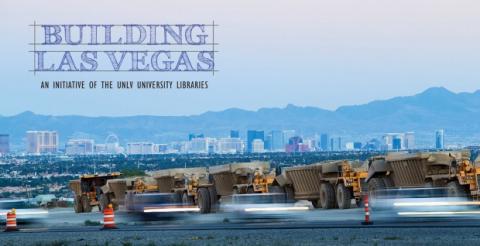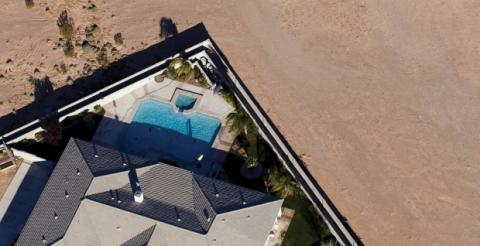
Learn more about the 2017 Building Las Vegas Summer Speaker Series.
Project Overview
Between 1970 and 2010, Southern Nevada’s population increased seven-fold. The urban skyline changed dramatically, while dense suburban tracts pushed at the edges of the desert. The UNLV University Libraries Special Collections and Archives launched the Building Las Vegas collecting initiative in 2016 to collect and preserve evidence about this dramatic growth. This focused effort ensured that future students and researchers -- urban planners, geographers, architects, historians, sociologists, and others -- could study and learn from our unique built environment.
From the region’s first plots, roads, pipes, and buildings, to the latest plans for casino resorts or public transportation, Special Collections and Archives preserves more than a century of evidence about the development of Las Vegas. As Southern Nevada begins its next period of growth, the time is now to collect more documentation about our ever-changing landscape so future generations can understand how our city and county came to be.
Project Goals
Building Las Vegas was a five-year project that :
- Collected oral histories with individuals who shaped our region’s built environment.
- Identified and collected archival records from architects, builders, designers, developers, engineers, planners, politicians, and more.
- Photographed the region to document patterns in urban and suburban development, architectural features, and the interplay between built and natural environments.
- Organized and preserved historical records to make them accessible for research.
- Digitized photographs, plans, maps, reports, correspondence, audio and video recordings, and more.
- Built an online, searchable repository for the public to access original evidence and first-hand testimonies about the region’s development.
- Created research fellowships, lectures, panel discussions, and exhibits.
Collecting Areas
- Architecture and the built environment
- Environmental impacts
- Land use
- Local businesses
- Master planned communities
- Neighborhoods
- Parks and recreation
- Revitalization efforts
- Transportation
- Urban planning and growth
- Water management
How can you help?
Donate archives
We continue to seek donations of personal or corporate archives with historical evidence about our collecting areas. Such archives might include:
- Visual documentation, including sketches, drawings, site plans, elevations, renderings, exhibits, photographs.
- Publicity and marketing materials, including brochures, sales information, floor plans, press releases, advertisements.
- Executive or project correspondence and memoranda (non-routine), master budgets.
- Minutes of meetings or conferences, records of approvals.
- Proposals, bids, and contracts.
- Reports, including environmental impact reports, real estate reports, project reports, engineering reports, on-site reports, soil boring reports, land use reports, surveying reports, due diligence reports.
- Government / community relations records, including community awareness plans, hearing minutes, zoning records, land use and project development applications, major permits.
- Maps.
Share your oral history
We collect eyewitness accounts, memories, and personal commentaries from community members. Volunteer to share your role in the region’s development, and a trained interviewer will ask you a series of questions about your life, career, impact, and reflections. We record and transcribe your oral history, and make it available for research. You can also recommend colleagues whose stories we should collect.
Make a donation
Building Las Vegas was launched in 2016 with generous support from the Tiberti family. The project will continue with your monetary support. Funding will help us:
- Hire oral historians to record and transcribe oral histories.
- Hire archivists to collect, sort, and preserve archival records.
- Provide internships for graduate students.
- Make historical materials available online.
- Bring scholars to UNLV to study these collections.

Special Collections and Archives
Special Collections and Archives serves as a trusted repository for Southern Nevada’s history. Since 1967 more than 5,000 residents and organizations have entrusted their archives and oral histories to us to preserve for future generations. Professionally trained archivists and librarians expertly curate these holdings, and make them widely available for the public to use in our Reading Room, online, in classes, and exhibits. We inspire life-long learning and engagement with our region’s unique past.
Contact Us
Special Collections and Archives
(702) 895-2234 special.collections@unlv.edu
University Libraries Development
(702) 895-2286 libad@unlv.edu
Oral History Research Center
(702) 895-2222 oralhistory@unlv.edu

